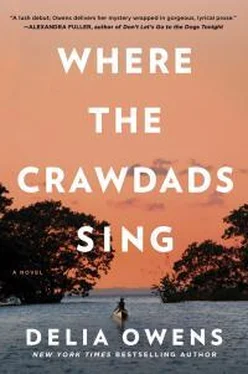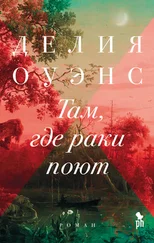The fisherman—a merry-faced, hatted old man—puttered into view, saw neither Kya nor Tate, and disappeared beyond the bend. But she remained frozen, listening until the motor whined away, then stood, dabbing her brow. Continued to look in the direction of the boat as a deer eyes the empty brush of a departed panther.
On some level he knew she behaved this way, but since the feather game, had not witnessed the raw, unpeeled core. How tormented, isolated, and strange.
He’d been at college less than two months but had already stepped directly into the world he wanted, analyzing the stunning symmetry of the DNA molecule as if he’d crawled inside a glistening cathedral of coiling atoms and climbed the winding, acidic rungs of the helix. Seeing that all life depends on this precise and intricate code transcribed on fragile, organic slivers, which would perish instantly in a slightly warmer or colder world. At last, surrounded by enormous questions and people as curious as he to find the answers, drawing him toward his goal of research biologist in his own lab, interacting with other scientists.
Kya’s mind could easily live there, but she could not. Breathing hard, he stared at his decision hiding there in cord grass: Kya or everything else.
“Kya, Kya, I just can’t do this,” he whispered. “I’m sorry.”
After she moved away, he got into his boat and motored back toward the ocean. Swearing at the coward inside who would not tell her good-bye.
23. The Shell
1965
The night after seeing Chase Andrews on Jumpin’s wharf, Kya sat at her kitchen table in the easy flicker of lantern light. She’d started cooking again, and she nibbled on a supper of buttermilk biscuits, turnips, and pinto beans, reading while she ate. But thoughts of the picnic-date with Chase the next day unraveled every sentence.
Kya stood and walked into the night, into the creamy light of a three-quarter moon. The marsh’s soft air fell silklike around her shoulders. The moonlight chose an unexpected path through the pines, laying shadows about in rhymes. She strolled like a sleepwalker as the moon pulled herself naked from the waters and climbed limb by limb through the oaks. The slick mud of the lagoon shore glowed in the intense light, and hundreds of fireflies dotted the woods. Wearing a secondhand white dress with a flowing skirt and waving her arms slowly about, Kya waltzed to the music of katydids and leopard frogs. She slid her hands along her sides and up her neck. Then moved them along her thighs as she held Chase Andrews’s face in her eyes. She wanted him to touch her this way. Her breathing deepened. No one had ever looked at her as he did. Not even Tate.
She danced among the pale wings of mayflies, fluttering above the bright moon-mud.
• • •
THE NEXT MORNING, she rounded the peninsula and saw Chase in his boat, just offshore. Here in daylight, reality drifted ahead, waiting, and her throat dried. Steering onto the beach, she stepped out and pulled her boat in, the hull crunching against the sand.
Chase drifted up alongside. “Hi.”
Looking over her shoulder, she nodded. He stepped out of his boat and held out his hand to her—long tanned fingers, an open palm. She hesitated; touching someone meant giving part of herself away, a piece she never got back.
Even so, she placed her hand lightly in his. He steadied her as she stepped into the stern and sat on the cushioned bench. A warm, fine day beamed down, and Kya, wearing denim cutoffs and a white cotton blouse—an outfit she’d copied from the others—looked normal. He sat next to her, and she felt his sleeve slide gently across her arm.
Chase eased the boat toward the ocean. The open water tossed the boat more than the quiet marsh, and she knew the pitching motion of the sea would brush her arm against his. That anticipation of touch kept her eyes straight ahead, but she did not move away.
Finally, a larger wave rose and dipped, and his arm, solid and warm, caressed hers. Jarring away, then touching again with every rise and drop. And when a swell surged beneath them, his thigh brushed against hers and her breathing stopped.
As they headed south along the coast, theirs the only boat in this remoteness, he accelerated. Ten minutes on, several miles of white beach stretched along the tide line, protected from the rest of the world by a rounded, thick forest. Up ahead, Point Beach unfolded into the water like a brilliant white fan.
Chase had not said a word since his greeting; she had not spoken at all. He glided the boat onto shore and tucked the picnic basket in the boat’s shadow on the sand.
“Wanta walk?” he asked.
“Yes.”
They strolled along the water, each small wave rushing their ankles in little eddies and then sucking at their feet as it was pulled back into the sea.
He didn’t hold her hand, but now and then, in natural movement, their fingers brushed. Occasionally they knelt to examine a shell or a strand of transparent seaweed spiraled into art. Chase’s blue eyes were playful; he smiled easily. His skin was dark tan like hers. Together they were tall, elegant, similar.
Kya knew Chase had chosen not to go to college but to work for his dad. He was a standout in town, the tom turkey. And somewhere within, she worried she was also a piece of beach art, a curiosity to be turned over in his hands, then tossed back on the sand. But she walked on. She’d given love a chance; now she wanted simply to fill the empty spaces. Ease the loneliness while walling off her heart.
After a half mile he faced her and bowed low, sweeping his arm in an exaggerated invitation for them to sit on the sand, against a driftwood log. They dug their feet into the white crystals and leaned back.
From his pocket Chase pulled out a harmonica.
“Oh,” she said, “you play.” The words felt rough on her tongue.
“Not very good. But when I got an audience leanin’ against driftwood on the beach . . .” Closing his eyes, he played “Shenandoah,” his palm fluttering on the instrument like a bird trapped against glass. It was a lovely, plaintive sound, like a note from a faraway home. Then, abruptly, he stopped midsong and picked up a shell slightly larger than a nickel, creamy white with bright splotches of red and purple.
“Hey, look at this,” he said.
“Oh, it’s an ornate scallop, Pecten ornatus ,” Kya said. “I only see them rarely. There are many of that genus here, but this particular species usually inhabits regions south of this latitude because these waters are too cool for them.”
He stared at her. Of all the gossip, no one ever mentioned that the Marsh Girl, the girl who couldn’t spell dog , knew the Latin names of shells, where they occurred—and why, forchristsake.
“I don’t know about that,” he said, “but look here, it’s twisted.” The little wings flaring on either side of the hinge were crooked, and there was a perfect little hole at the base. He turned it over in his palm. “Here, you keep it. You’re the shell girl.”
“Thanks.” She slid it into her pocket.
He played a few more songs, ending with a stampede of “Dixie,” and then they walked back to the wicker picnic basket and sat on a plaid blanket eating cold fried chicken, salt-cured ham and biscuits, and potato salad. Sweet and dill pickles. Slices of four-layer cake with half-inch-thick caramel icing. All homemade, wrapped in wax paper. He opened two bottles of Royal Crown Cola and poured them into Dixie cups—her first drink of soda pop in her life. The generous spread was incredible to her, with the neatly arranged cloth napkins, plastic plates and forks. Even minuscule pewter salt and pepper shakers. His mother must have packed it, she thought, not knowing he was meeting the Marsh Girl.
Читать дальше











